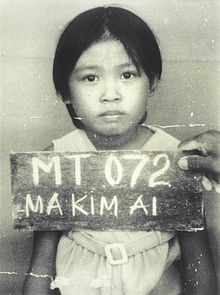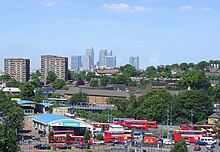| Revision as of 00:48, 7 September 2014 edit86.180.152.25 (talk) →Education and employment← Previous edit | Revision as of 14:26, 7 September 2014 edit undoNeilN (talk | contribs)134,455 edits Reverted 2 edits by 86.180.152.25 (talk): Unsourced. (TW)Next edit → | ||
| Line 15: | Line 15: | ||
| Vietnamese immigration to the United Kingdom started after the end of the ] in 1975, with the UK accepting refugees from Hong Kong, its colony at the time. Most early immigrants were refugee ] fleeing persecution by the victorious communists, the rest were students, academics or business people. Vietnamese refugees initially found it fairly difficult to settle into a British lifestyle. Because the Vietnamese community in the United Kingdom was then small, the new wave of immigrants found it much harder to integrate to their host country compared to immigrants in ], ] or the ], where the Vietnamese communities was much larger. The early government policy of spreading newcomers thinly compounded matters by depriving them of vital mutual support. Many began gravitating towards larger cities such as London with the majority settling in the ] (Vietnamese is the second most common language in the borough), ] and ] areas.{{Citation needed|date=January 2009}} The existence of much larger and more established overseas Chinese communities in the UK has had a significant though perhaps understated effect in helping the new immigrants setting roots in their new | Vietnamese immigration to the United Kingdom started after the end of the ] in 1975, with the UK accepting refugees from Hong Kong, its colony at the time. Most early immigrants were refugee ] fleeing persecution by the victorious communists, the rest were students, academics or business people. Vietnamese refugees initially found it fairly difficult to settle into a British lifestyle. Because the Vietnamese community in the United Kingdom was then small, the new wave of immigrants found it much harder to integrate to their host country compared to immigrants in ], ] or the ], where the Vietnamese communities was much larger. The early government policy of spreading newcomers thinly compounded matters by depriving them of vital mutual support. Many began gravitating towards larger cities such as London with the majority settling in the ] (Vietnamese is the second most common language in the borough), ] and ] areas.{{Citation needed|date=January 2009}} The existence of much larger and more established overseas Chinese communities in the UK has had a significant though perhaps understated effect in helping the new immigrants setting roots in their new | ||
| country. | country. | ||
| Recently, the Vietnamese in Britain have rose to prominence in the British press due to criminal ]-growing activities. Some recent economic immigrants also engage in gang and human trafficking.<ref>{{cite news | |||
| + | |||
| |url=http://news.bbc.co.uk/2/hi/asia-pacific/3965035.stm | |||
| + | |||
| |title=Vietnam's new UK migrants | |||
| + | |||
| |date=] | |||
| + | |||
| |accessdate=2007-12-17 | |||
| + | |||
| |publisher=] | |||
| + | |||
| |author=Nga Pham}}</ref> | |||
| ==Demographics== | ==Demographics== | ||
| Line 46: | Line 32: | ||
| ==Education and employment== | ==Education and employment== | ||
| Amongst the first Vietnamese refugees in the country, it was estimated that 76% received education below secondary school level. According to 2001 findings, only 18.7% of London's Vietnamese-born population had higher level qualifications, which is 15% below the London average. Despite this, in the London borough of Lewisham, Vietnamese pupils along with ] and ]ns outperformed all other ethnic groups, with Vietnamese girls being more successful than Vietnamese boys. The lack of formal education or recognised qualifications, along with the fact that the vast majority of people in the community originally not being able to speak much English, had meant that finding employment was very difficult (around 23.5% of London's Vietnamese-born community of a working ages are unemployed). Over recent years, the nail industry has become the fastest growing business sector within the community. It is thought that in London, over half of all Vietnamese owned businesses revolve around this industry |
Amongst the first Vietnamese refugees in the country, it was estimated that 76% received education below secondary school level. According to 2001 findings, only 18.7% of London's Vietnamese-born population had higher level qualifications, which is 15% below the London average. Despite this, in the London borough of Lewisham, Vietnamese pupils along with ] and ]ns outperformed all other ethnic groups, with Vietnamese girls being more successful than Vietnamese boys. The lack of formal education or recognised qualifications, along with the fact that the vast majority of people in the community originally not being able to speak much English, had meant that finding employment was very difficult (around 23.5% of London's Vietnamese-born community of a working ages are unemployed). Over recent years, the nail industry has become the fastest growing business sector within the community. It is thought that in London, over half of all Vietnamese owned businesses revolve around this industry. Catering remains a historically significant employer for the Vietnamese community as a whole. Education and employment statistics for ] British-born people of Vietnamese origin are largely uncollated.<ref name=RM/> | ||
| ==Social issues== | ==Social issues== | ||
Revision as of 14:26, 7 September 2014
Ethnic group| Regions with significant populations | |
|---|---|
| London, Birmingham, Leeds, Manchester | |
| Languages | |
| Vietnamese, English and various other languages of Vietnam | |
| Religion | |
| Primarily Mahayana Buddhism, Confucianism, with some Roman Catholicism | |
| Related ethnic groups | |
| Vietnamese people, Vietnamese people in France, Overseas Vietnamese, East Asians in the United Kingdom |
Vietnamese people in the United Kingdom include British citizens and non-citizen immigrants and expatriates of Vietnamese descent in the United Kingdom. They form a part of the worldwide Vietnamese diaspora.
History and settlement
Vietnamese immigration to the United Kingdom started after the end of the Vietnam War in 1975, with the UK accepting refugees from Hong Kong, its colony at the time. Most early immigrants were refugee boat people fleeing persecution by the victorious communists, the rest were students, academics or business people. Vietnamese refugees initially found it fairly difficult to settle into a British lifestyle. Because the Vietnamese community in the United Kingdom was then small, the new wave of immigrants found it much harder to integrate to their host country compared to immigrants in Australia, France or the United States, where the Vietnamese communities was much larger. The early government policy of spreading newcomers thinly compounded matters by depriving them of vital mutual support. Many began gravitating towards larger cities such as London with the majority settling in the Lewisham (Vietnamese is the second most common language in the borough), Southwark and Hackney areas. The existence of much larger and more established overseas Chinese communities in the UK has had a significant though perhaps understated effect in helping the new immigrants setting roots in their new country.
Demographics
Population

The 2001 UK Census recorded 23,347 people born in Vietnam with over 65% of these originated in Northern Vietnam. According to Viethome.co.uk there are at least 90,000 people of Vietnamese origin living in England and Wales, out of this around 20,000 are thought to be undocumented migrants and 8,000 are temporary students.
Distribution
As with most emerging ethnic groups in the UK, the largest concentrations of Vietnamese people can be found in the larger metropolitan areas and cities, such as London (33,000), with the majority (around 1/3 of all Vietnamese Londoners) being located in Lewisham, Southwark and Hackney. Significant Vietnamese communities also exist in Birmingham (over 4,000), Leeds and Manchester (over 2,500).
Languages
Although the majority of the first Vietnamese immigrants to the UK spoke no English at all, second generation Vietnamese descendants as well as more recent immigrants have a better understanding of the English language. It is unknown how many of the 55,000 Vietnamese people in the UK speak English as a primary or secondary language, but according to Ethnologue is the main language of 22,000 UK residents.
Religion
By far the most common religions for Vietnamese people in the UK are Buddhism and Roman Catholicism, which are followed by roughly 80% and 20% (respectively) of the total community's total population. This differs sharply from the religious breakdown of Vietnam, where 85% of the population are Buddhists and 7% are Roman Catholic.
Education and employment
Amongst the first Vietnamese refugees in the country, it was estimated that 76% received education below secondary school level. According to 2001 findings, only 18.7% of London's Vietnamese-born population had higher level qualifications, which is 15% below the London average. Despite this, in the London borough of Lewisham, Vietnamese pupils along with Chinese and Indians outperformed all other ethnic groups, with Vietnamese girls being more successful than Vietnamese boys. The lack of formal education or recognised qualifications, along with the fact that the vast majority of people in the community originally not being able to speak much English, had meant that finding employment was very difficult (around 23.5% of London's Vietnamese-born community of a working ages are unemployed). Over recent years, the nail industry has become the fastest growing business sector within the community. It is thought that in London, over half of all Vietnamese owned businesses revolve around this industry. Catering remains a historically significant employer for the Vietnamese community as a whole. Education and employment statistics for second generation British-born people of Vietnamese origin are largely uncollated.
Social issues

Health
A PRIAE study in 2005 showed a high number of cases of osteoporosis and memory problems amongst elderly Vietnamese people in the UK. It is believed that the Vietnamese community in the UK finds it extremely difficult to gain access to the country's health services, the main reasons for this include unfamiliarity with the British health and social care sectors, Vietnamese cultural beliefs, financial difficulties, lack of sympathy and support from professionals, as well as many immigrants being incapable of speaking English or being able to understand it in written form.
Housing
A study by Refugee Action showed that during the years leading up to 1993, the majority of Vietnamese British people were concentrated in overcrowded local authority housing. More recent findings state the reasons for South East Asians in the UK requesting council housing as being because they were told to leave the family home, health/medical issues and relationship breakdowns.
See also
- East Asian people in the United Kingdom
- Vietnamese people
- Overseas Vietnamese
- Notable Britons of Vietnamese descent
- Vietnamese people in France
- Vietnamese American
Bibliography
- Sims, Jessica Mai: The Vietnamese Community in Great Britain - Thirty Years On
- Vietnamese living in the UK
References
- ^ "Vietnamese Community in Great Britain". Runnymede Trust. Retrieved 2008-12-19.
- "Nguoi Viet Sau 30 Nam Tai Anh Quoc".
- "Meeting the needs of Vietnamese adult learners". National Institute of Adult Continuing Education. Archived from the original on 2007-10-09. Retrieved 2012-06-15.
{{cite journal}}: Cite journal requires|journal=(help) - "Languages of the United Kingdom". Ethnologue: Languages of the World. SIL International. Retrieved 2012-06-15.
- "Vietnamese". Directory of Information on Faiths and Cultures. National Health Service. Retrieved 2012-06-15.
External links
- Vietnamese Community in the United Kingdom - VietHome.co.uk
- Vietnamese Chartered Accountants and Business Advisers - hienle.co.uk
- Vietnamese London
- BBC Vietnamese in Birmingham
- Vietnamese people in Birmingham
| Overseas Vietnamese | |
|---|---|
| Africa | |
| Americas | |
| Asia | |
| Europe | |
| Oceania | |
| Related | |
| Asian diasporas in the United Kingdom | |||||
|---|---|---|---|---|---|
| Central Asia | |||||
| East Asia | |||||
| South Asia | |||||
| Southeast Asia | |||||
| West Asia | |||||